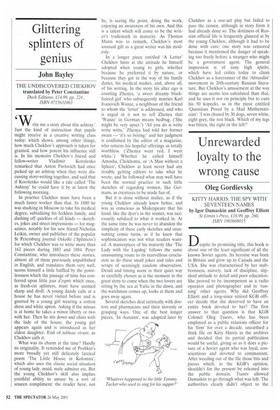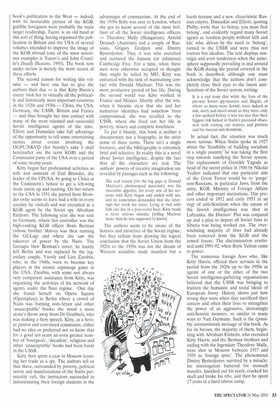Unrewarded loyalty to the wrong cause
Oleg Gordievsky
KITTY HARRIS: THE SPY WITH SEVENTEEN NAMES by Igor Damaskin and Geoffrey Elliott St Ertnin's Press, £18.99, pp. 260, ISBN 1903608015 Despite its promising title, this book is about one of the least significant of all the known Soviet agents. Its heroine was born in Britain and grew up in Canada and the USA. She was characterised by her stubbornness, naivety, lack of discipline, slipshod attitude to detail and poor education. She proved to be incompetent as a radio operator and photographer and in 'running' other agents. Why did Geoffrey Elliott and a long-since retired KGB officer decide that she deserved to have an entire book devoted to her? The first answer to that question is that KGB Colonel Oleg Tsarev, who has been employed as a public relations officer for his 'firm' for over a decade, unearthed a thick file on Kitty Harris in the archives and decided that its partial publication would be useful, giving us as it does a picture of a Soviet agent who was loyal, conscientious and devoted to communism. After weeding out of the file those bits and pieces which, in the KGB's opinion, shouldn't for the present be released into the public domain, Tsarev allowed Damaskin to go through what was left. The authorities clearly didn't object to the
books publication in the West — indeed, with its favourable picture of the KGB, gullible foreigners were probably the main target readership. Tsarev is an old hand at this sort of thing, having organised the publication in Britain and the USA of several volumes intended to improve the image of the KGB abroad (one of the most notorious examples is Tsarev's and John Costello's Deadly Illusions, 1993). The book now under review is merely the most recent of these efforts.
The second reason for writing this volume — and here one has to give the authors their due — is that Kitty Harris's career took her to virtually all the politically and historically most important countries in the 1920s and 1930s — China, the USA, Germany, the USSR, Britain and France — and thus brought her into contact with many of the most talented and successful Soviet intelligence agents of the time. Elliott and Damaskin take full advantage of the opportunity to tell some entertaining stories about events involving the OGPUINKVD (for brevity's sake I shall hereinafter use the term KGB) and the Communist party of the USA over a period of some twenty years.
Kitty began her professional activities as wife and assistant of Earl Browder, the leader of the CPUSA, by going to China at the Comintem's behest to get a left-wing trade union up and running. On her return to the USA in 1931 she parted from Browder (who seems to have had a wife in every country he visited) and was recruited as a KGB agent by the Soviet spy Abraham Einhorn. The following year she was sent to Germany, where her controller was the high-ranking KGB officer Boris Berman (whose brother Matvey was then running the GULag) and where she saw the takeover of power by the Nazis. The Gestapo blew Berman's cover; he hastily left Berlin and was replaced by the legendary couple, Vassily and Liza Zarubin, who, in the 1940s, were to become key players in the atomic espionage game in the USA. Zarubin, with some not always very competent assistance from Kitty, was organising the activities of his network of agents under the Nazi regime. One day she found herself on Opera Square (Opernplatz) in Berlin where a crowd of Nazis was burning non-Aryan and other 'unacceptable' books; she stood a mere stone's throw away from Dr Goebbels, who was making a fiery speech. Kitty, as a Soviet patriot and convinced communist, either had no idea or preferred not to know that for a good ten years an even greater number of 'bourgeois', 'decadent', religious and other 'unacceptable' books had been burnt in the USSR.
Kitty then spent a year in Moscow learning her trade as a spy. The authors tell us that there, surrounded by poverty, political terror and manifestations of the Stalin personality cult, the instructors succeeded in indoctrinating their foreign students in the advantages of communism, At the end of the 1930s Kitty was sent to London, where she got to know several of the most brilliant of all the Soviet intelligence officers — Theodore MaIly (Hungarian), Arnold Deutsch (Austrian) and a couple of Russians, Grigory Grafpen and Dmitry Bystrolyotov. They it was who recruited and nurtured the famous (or infamous) Cambridge Five. For a time, when these men were otherwise occupied or thought they might be tailed by MI5, Kitty was entrusted with the task of maintaining contact with Donald Maclean. This was the most productive period of her life. During the second world war Kitty worked in France and Mexico. Shortly after the war, when it became clear that she and her numerous identities had somehow been compromised, she was recalled to the USSR, where she lived out her life in poverty, misery and complete loneliness.
To put it bluntly, this book is neither a documentary nor a biography, in the strict sense of these terms. There isn't a single footnote, and the bibliography is extremely brief and selective. In reality this is a novel about Soviet intelligence, despite the fact that all the characters are real. The authors' powers of creative imagination are revealed by passages such as the following:
The real reason [for the big gaps in Donald Maclean's photocopied materials] was his insatiable appetite, for every one of his sessions with Kitty began and ended with sex, and he sometimes demanded that she interrupt her work for more. Lying in bed with him one day in a post-coital haze, Kitty made a more serious mistake [telling Maclean more than he was supposed to know].
The authors seem to be aware of the horrors and atrocities of the Soviet regime, but they refrain from drawing the logical conclusion that the Soviet Union from the 1920s to the 1950s was not the dream of Western socialists made manifest but a harsh tyranny and a new, chauvinistic Russian empire. Damaskin and Elliott, quoting Philby, write that 'to betray, you must first belong', and evidently regard many Soviet agents as 'rootless people without kith and kin' who, driven by the need to 'belong', turned to the USSR and were thus not traitors but idealists. The text displays nostalgia and even tenderness when the atmosphere supposedly prevailing in and around the KGB during the period covered in the book is described, although one must acknowledge that the authors don't completely close their eyes to the latent antiSemitism of the Soviet system, writing:
It is a sad irony that while the lives of the pre-war Soviet spy-masters and illegals, of whom so many were Jewish, were indeed at risk. savvy and street-smart as they were, only a few spotted before it was too late that their biggest risk lurked in Stalin's paranoid obsession with rooting out traitors and plotters and his visceral anti-Semitism.
In actual fact, the situation was much more serious. When Stalin spoke in 1927 about the 'feasibility of building socialism in a single country' he was taking the first step towards russifying the Soviet system. The replacement of Genrikh Yagoda as head of the secret police in 1936 by Nikolai Yezhov indicated that one particular aim of the Great Terror would be to 'purge' non-Russians, in particular Jews, from the army, KGB, Ministry of Foreign Affairs and other important institutions. This process ended in 1952 and early 1953 in an orgy of anti-Semitism when the cream of the Jewish intelligentsia was shot in Lubyanka, the Doctors' Plot was conjured up and a plan to deport all Soviet Jews to Siberia was being worked out. The overwhelming majority of Jews had already been removed from the KGB and the armed forces. The discrimination continued until 1991-92, when Boris Yeltsin came to power.
The numerous foreign Jews who, like Kitty Harris, offered their services in the period from the 1920s up to the 1950s as agents of one or the other of the two Soviet intelligence-gathering organisations believed that the USSR was bringing to fruition the humanist and social ideals of European Jewry. History shows just how wrong they were when they sacrificed their careers and often their lives to strengthen the power of an aggressive, increasingly anti-Semitic monster, so similar in many ways to Nazi Germany. Such is the (possibly unintentional) message of this book. As for its heroes, the majority of them, beginning with Abraham Einhorn, who recruited Kitty Harris, and the Berman brothers and ending with the legendary Theodore Malty, were shot in Moscow between 1937 and 1939 as 'foreign spies'. The phenomenal Dmitry Bystrolyotov survived by a miracle: his interrogators battered his stomach muscles, knocked out his teeth, cracked his skull and broke his ribs, and then he spent 17 years in a hard labour camp.



















































































 Previous page
Previous page